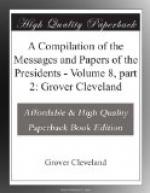The establishment of an uniform standard of weights and measures was one of the specific objects contemplated in the formation of our Constitution, and to fix that standard was one of the powers delegated by express terms in that instrument to Congress. The Governments of Great Britain and France have scarcely ceased to be occupied with inquiries and speculations on the same subject since the existence of our Constitution, and with them it has expanded into profound, laborious, and expensive researches into the figure of the earth and the comparative length of the pendulum vibrating seconds in various latitudes from the equator to the pole. These researches have resulted in the composition and publication of several works highly interesting to the cause of science. The experiments are yet in the process of performance. Some of them have recently been made on our own shores, within the walls of one of our own colleges, and partly by one of our own fellow-citizens. It would be honorable to our country if the sequel of the same experiments should be countenanced by the patronage of our Government, as they have hitherto been by those of France and Britain.
Connected with the establishment of an university, or separate from it, might be undertaken the erection of an astronomical observatory, with provision for the support of an astronomer, to be in constant attendance of observation upon the phenomena of the heavens, and for the periodical publication of his observations. It is with no feeling of pride as an American that the remark may be made that on the comparatively small territorial surface of Europe there are existing upward of 130 of these light-houses of the skies, while throughout the whole American hemisphere there is not one. If we reflect a moment upon the discoveries which in the last four centuries have been made in the physical constitution of the universe by the means of these buildings and of observers stationed in them, shall we doubt of their usefulness to every nation? And while scarcely a year passes over our heads without bringing some new astronomical discovery to light, which we must fain receive at second hand from Europe, are we not cutting ourselves off from the means of returning light for light while we have neither observatory nor observer upon our half of the globe and the earth revolves in perpetual darkness to our unsearching eyes?
When, on the 25th of October, 1791, the first President of the United States announced to Congress the result of the first enumeration of the inhabitants of this Union, he informed them that the returns gave the pleasing assurance that the population of the United States bordered on 4,000,000 persons. At the distance of thirty years from that time the last enumeration, five years since completed, presented a population bordering upon 10,000,000. Perhaps of all the evidences of a prosperous and happy condition of human society the rapidity of the increase of population




